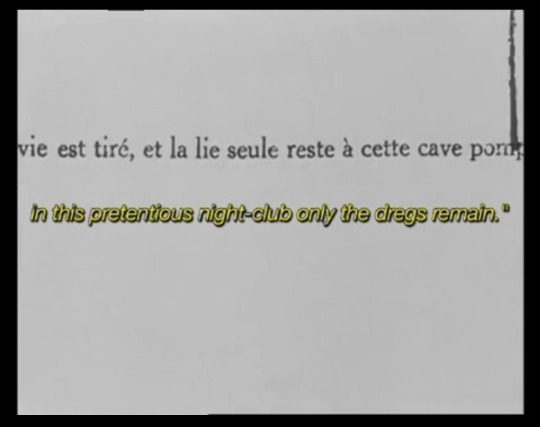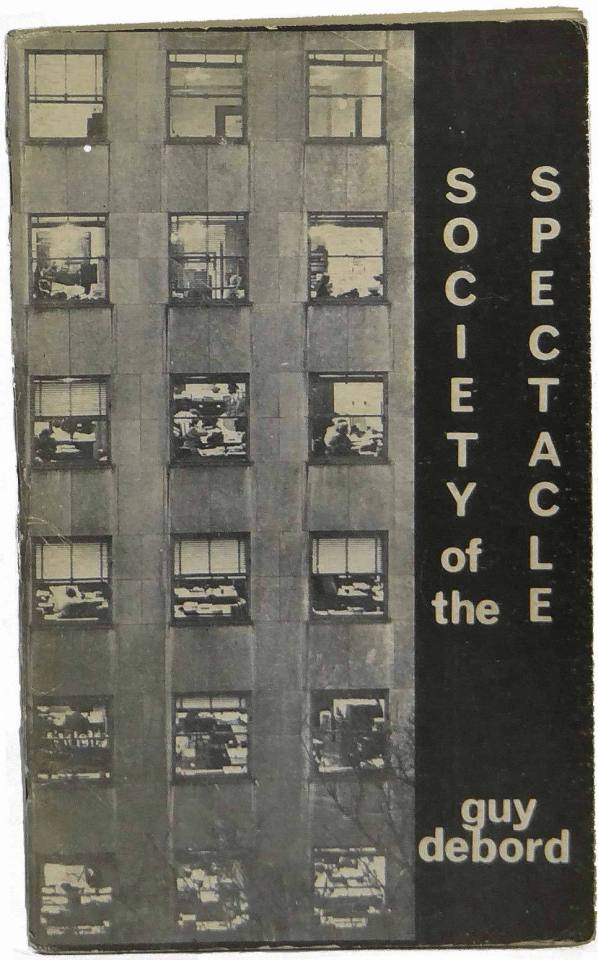#the society of the spectacle
Text
The agent of the spectacle who is put on stage as a star is the opposite of an individual; he is as clearly the enemy of his own individuality as of the individuality of others. Entering the spectacle as a model to be identified with, he renounces all autonomous qualities in order to identify himself with the general law of obedience to the flow of things. The stars of consumption, though outwardly representing different personality types, show each of these types enjoying equal access to, and deriving equal happiness from the entire realm of consumption. The stars of decision-making must possess the full range of admired human qualities: official differences between them are thus canceled out by the official similarity implied by their supposed excellence in every field of endeavor. (...) The admirable people who personify the system are well known for not being what they seem; they attain greatness by stooping below the reality of the most insignificant individual life, and everyone knows it.
— Guy Debord, The Society of the Spectacle
106 notes
·
View notes
Text

43 notes
·
View notes
Quote
Where the real world changes into simple images, the simple images become real beings and effective motivations of hypnotic behavior.
Guy Debord, The Society of the Spectacle
163 notes
·
View notes
Text
“The spectacle is not a collection of images, but a social relation among people, mediated by images.”
Guy Debord
2 notes
·
View notes
Text
Wherever abundant consumption is established, one particularly spectacular opposition is always in the forefront of illusory roles: the antagonism between youth and adults. But real adults — people who are masters of their own lives — are nowhere to be found. And a youthful transformation of what exists is in no way characteristic of those who are now young; it is present solely in the economic system, in the dynamism of capitalism. It is things that rule and that are young, vying with each other and constantly replacing each other.
— Guy Debord on generational discourse in The Society of the Spectacle
#guy debord#the society of the spectacle#so now can we all shut up about gen z#good thinking on the current 'adults are just overgrown kids' discourse though#always have been dot meme
8 notes
·
View notes
Text
The Society of the Spectacle
[from Wikipedia]
The Society of the Spectacle (French: La société du spectacle) is a 1967 work of philosophy and Marxist critical theory by Guy Debord, in which the author develops and presents the concept of the Spectacle. The book is considered a seminal text for the Situationist movement. Debord published a follow-up book Comments on the Society of the Spectacle in 1988.
The work is a series of 221 short theses in the form of aphorisms. Each thesis contains one paragraph.
Degradation of human life
Debord traces the development of a modern society in which authentic social life has been replaced with its representation: "All that once was directly lived has become mere representation."[2] Debord argues that the history of social life can be understood as "the decline of being into having, and having into merely appearing."[3] This condition, according to Debord, is the "historical moment at which the commodity completes its colonization of social life."[4]
The spectacle is the inverted image of society in which relations between commodities have supplanted relations between people, in which "passive identification with the spectacle supplants genuine activity". "The spectacle is not a collection of images," Debord writes, "rather, it is a social relation among people, mediated by images."[5]
In his analysis of the spectacular society, Debord notes that the quality of life is impoverished,[6] with such a lack of authenticity that human perceptions are affected, and an attendant degradation of knowledge, which in turn hinders critical thought.[7] Debord analyzes the use of knowledge to assuage reality: the spectacle obfuscates the past, imploding it with the future into an undifferentiated mass, a type of never-ending present; in this way the spectacle prevents individuals from realizing that the society of spectacle is only a moment in history, one that can be overturned through revolution.[8][9]
Debord's aim and proposal is "to wake up the spectator who has been drugged by spectacular images...through radical action in the form of the construction of situations...situations that bring a revolutionary reordering of life, politics, and art". In the Situationist view, situations are actively created moments characterized by "a sense of self-consciousness of existence within a particular environment or ambience".[10]
Debord encouraged the use of détournement, "which involves using spectacular images and language to disrupt the flow of the spectacle."
https://theanarchistlibrary.org/library/guy-debord-the-society-of-the-spectacle.pdf
3 notes
·
View notes
Text
There's snow outside and the flurries are so large it looks fake... Like shredded paper snow.
8 notes
·
View notes
Text
Today is good day to read The Society of the Spectacle by Guy Debord.
4 notes
·
View notes
Text


La Société du Spectacle, 1973, dir. Guy Debord.
3 notes
·
View notes
Photo







Guy Debord, La Société du Spectacle (1967, trans. Ken Knabb) // Nope (2022, dir. Jordan Peele)
4K notes
·
View notes
Text
Chainsaw Man is about self-destruction. It’s about self-destruction as a means of reclaiming your autonomy in an environment where you are consistently denied it. Chainsaw Man is about denial of autonomy.
Chainsaw Man is about how, when you are in an environment where you are denied your own autonomy, you learn to view interpersonal relationships as interactions you have no control over unless you find a means of controlling the other members of that relationship — whether that be through methods of fight, flight, freeze, or fawn.
Chainsaw Man is about how denial of autonomy is framed as love. Chainsaw Man is about how love that denies autonomy is violence.
#chainsaw man#csm#csm part 1#csm part 2#guess who just read the new chapter#going to write a ‘society of the spectacle’ type book except it’s just exploring the themes in csm#I love repetition#my csm thoughts#my csm analysis#meposting#autonomy#self-destruction#seeing Denji consistently turn his saws on himself in part 2 hurts ough#maladaptive coping mechanisms yk#destroy yourself to destroy those who hurt you#when I wish he was able to take care of himself in spite#but the situation he’s in.. doesn’t rly allow him to do that#csm denji#csm 152
187 notes
·
View notes
Text

Guy Debord - Society of the spectacle
28 notes
·
View notes
Quote
The illusory paradise that represented a total denial of earthly life is no longer projected into the heavens, it is embedded in earthly life itself.
Guy Debord, Society of the Spectacle
#reality#virtual#profane#sacred#world#paradise#spectacle#life#quotes#Debord#Guy Debord#Society of the Spectacle
158 notes
·
View notes
Text
Tova is on the magic dueling team and sometimes (all the time) she gets hurt during matches



#g/t#tiny#giant#giant and tiny#g/t fluff#giants and tinies#ez and tova#she’s not used to people being gentle with her#or considering her health in general#magic society emphasizes spectacle over wellbeing#and ez comes from an actually healthy caring family so he’s like WTF HOW ARE YOU GOOD WITH THIS#so she melts everytime 🥰🥰🥰
60 notes
·
View notes
Text

back by popular demand
Society of the Spectacle (Donald Nicholson-Smith Translation) : Guy Debord : Free Download, Borrow, and Streaming : Internet Archive
#society of the spectacle#situationism#situationist international#guy debord#society#social control#control
37 notes
·
View notes
Text
Ideology is the intellectual basis of class societies within the conflictual course of history. Ideological expressions have never been pure fictions; they represent a distorted consciousness of realities, and as such they have been real factors that have in turn produced real distorting effects. This interconnection is intensified with the advent of the spectacle ─ the materialization of ideology brought about by the concrete success of an autonomised system of economic production ─ which virtually identifies social reality with an ideology that has remoulded all reality in its own image.
Guy Debord, from Society of the Spectacle (tr. Ken Knabb)
#guy debord#ken knabb#society of the spectacle#nonfiction#essays#translations#on ideology#on the spectacle#2022 reads
149 notes
·
View notes